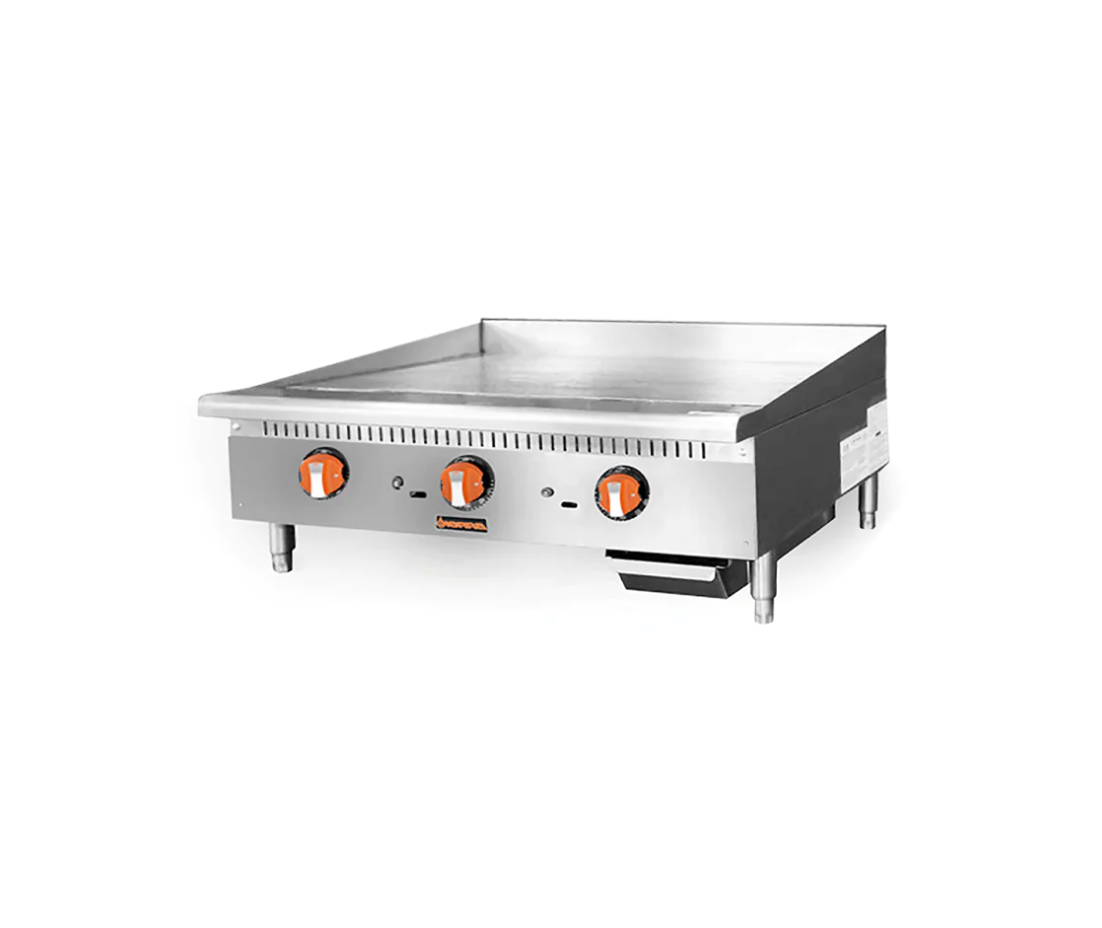Gas grills have firmly established themselves as an integral part of outdoor cooking for many households. They offer convenience and efficiency, making them a preferred choice for countless grill enthusiasts. But is a gas grill the ultimate solution, or could a flat top grill have something more to offer? Let's explore the key differences between these two grilling options and see which one emerges as the winner.
Flat Top Grills vs. Gas Grills: An In-Depth Comparison
-
Fuel Type: Gas vs. Gas
One of the first striking similarities between flat top grills and gas grills is the fuel type. Both rely on propane or natural gas burners, making them easy to operate and efficient. This similarity offers a certain level of convenience, as neither requires extensive fuel preparation like charcoal grills.
-
Cooking Temperature and Control
Gas grills are known for their ability to heat up quickly and achieve high temperatures. They are perfect for searing and creating those classic grill marks on steaks and other meats. The temperature control on a gas grill is straightforward, with adjustable knobs for varying heat levels.
Flat top grills, while not reaching the same scorching temperatures as gas grills, offer a more controlled cooking environment. Their temperature range typically falls between 300 and 400 degrees Fahrenheit, which is ideal for even and consistent cooking. This precision can be especially useful for griddling a wide variety of dishes.
-
Versatility: Traditional Grill vs. Flat Top Griddle
Gas grills excel at traditional grilling tasks like burgers, hot dogs, and steaks. They are the go-to choice for those who prefer the classic barbecue favorites. However, when it comes to versatility, flat top grills have the upper hand. With a flat cooking surface, they can handle a broad spectrum of dishes, from breakfast items like pancakes and bacon to stir-fries, fajitas, and more. The flat top grill's ability to cook delicate foods like eggs and veggies makes it a versatile choice.
-
Flavor Profile: Charred vs. Caramelized
Gas grills provide that classic charred flavor with their open flame cooking. The smoky essence and grill marks are beloved by many grillers, and they are a distinctive part of the gas grilling experience.
Flat top grills, while not offering the smoky flavor, bring a unique set of advantages. They offer incredible heat distribution, resulting in locked-in juices and a crispy, caramelized crust. The flat cooking surface traps drippings and marinades, preventing flare-ups that can negatively impact flavor. The result is food that's juicier and has a delectably crispy texture.
-
Cleanup and Maintenance: Gas Grill Ease vs. Griddle Maintenance
Cleaning a gas grill is relatively straightforward. The primary mess is confined to the cooking area, where drippings and residue may fall through the grates. To clean a gas grill, you can simply crank it up to a high heat, allowing burnt bits to carbonize. Once it cools, you scrape away the remaining debris, and your grill is ready for the next use.
Cleaning a flat top grill involves scraping down the cooking surface and emptying the grease trap. While it might be a bit more involved, it's still a manageable task. Cast iron or carbon steel griddles may require periodic re-seasoning to maintain their nonstick properties and prevent rust.
The Verdict: Gas Grill vs. Flat Top Grill
In the gas grill vs. flat top grill showdown, the choice ultimately comes down to personal preferences and priorities. Here's a summary of the pros and cons of each:
-
Gas Grill Pros:
- Quick and efficient heating.
- Classic charred flavor and grill marks.
- Relatively easy cleanup.
-
Gas Grill Cons:
- Less versatility in cooking options.
- Possibility of flavor-impacting flare-ups.
-
Flat Top Grill Pros:
- Exceptional versatility for various dishes.
- Controlled and even cooking temperatures.
- Unique caramelized texture and juiciness in food.
-
Flat Top Grill Cons:
- Lacks the smoky flavor of gas grills.
- May require more maintenance for cast iron or carbon steel griddles.
If you lean towards traditional grilling, cherish the charred flavor, and prefer classic barbecue fare, a gas grill is the natural choice. On the other hand, if you're looking for versatility, controlled cooking, and a unique culinary experience, a flat top grill might be the ideal selection.
Can't decide? Consider a hybrid grill that combines a flat top griddle with a gas grill. This way, you can enjoy the best of both worlds without compromising your favorite grilling experiences.
In the end, the decision is yours. Choose the grill that aligns with your taste and style of outdoor cooking. Happy grilling!


